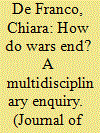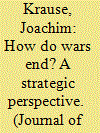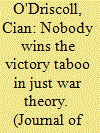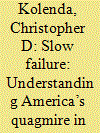| Srl | Item |
| 1 |
ID:
169103


|
|
|
|
|
| Summary/Abstract |
The cessation of military confrontations rarely coincides with the end of war. Legal and political matters continue after the last shot has been fired, civilians driven from their homes try to rebuild their houses and their lives, veterans need to adapt to their new role in civil society, and the struggle to define the history and the significance of past events only begins. In recent years, in particular, the changes in the character of contemporary warfare have created uncertainties across different disciplines about how to identify and conceptualise the end of war. It is therefore an opportune moment to examine how wars end from a multidisciplinary perspective that combines enquiries into the politics of war, the laws of war and the military and intellectual history of war. This approach enables both an understanding of how ‘the end’ as a concept informs the understanding of war in international relations, in international law and in history and a reconsideration of the nature of scientific method in the field of war studies as such.
|
|
|
|
|
|
|
|
|
|
|
|
|
|
|
|
| 2 |
ID:
169105


|
|
|
|
|
| Summary/Abstract |
This article gives an overview of the literature on war termination both in the fields of behaviouralism social sciences and policy-oriented strategic studies. It identifies shortcomings and problems related to both lines of research. The main problem is the undifferentiated and indiscriminate use of the term ‘war’. The article proposes a categorisation of wars that could form the basis for more thorough research on the topic of war termination.
|
|
|
|
|
|
|
|
|
|
|
|
|
|
|
|
| 3 |
ID:
169106


|
|
|
|
|
| Summary/Abstract |
This article aims to identify and elaborate the causes and ramifications of applying transitional justice, in particular accountability measures, to situations of war. It focuses on the correlations between peace and justice – and hence an important perspective on the question ‘how do wars end’. The article seeks to understand some of the main challenges associated with pursuing accountability for crimes committed in contemporary forms of conflict, including civil wars and abuses committed by major powers in armed conflict.
|
|
|
|
|
|
|
|
|
|
|
|
|
|
|
|
| 4 |
ID:
169107


|
|
|
|
|
| Summary/Abstract |
The decision by the US government to drop the atomic bombs on Japan is one of the most heavily debated questions in history. This article examines one element of that debate, in many ways the most surprising. That was the different views of the top of the military hierarchy in the USA, the Joint Chiefs of Staff (JCS). The JCS was on the whole more sceptical about using atomic weaponry than the USA’s civilian leadership, for ethical and strategic reasons. As such they were willing to consider very different ways of ending the war.
|
|
|
|
|
|
|
|
|
|
|
|
|
|
|
|
| 5 |
ID:
169104


|
|
|
|
|
| Summary/Abstract |
This article examines how scholars of the just war tradition think about the ethical dilemmas that arise in the endgame phase of modern warfare. In particular, it focuses upon their reticence to engage the idiom of ‘victory’. Why, it asks, have scholars been so reluctant to talk about what it means to ‘win’ a just war? It contends that, while just war scholars may have good reason to be sceptical about ‘victory’, engaging it would grant them a more direct view of the critical potentialities, but also the limitations, of just war reasoning.
|
|
|
|
|
|
|
|
|
|
|
|
|
|
|
|
| 6 |
ID:
169108


|
|
|
|
|
| Summary/Abstract |
The United States government has no organised way of thinking about war termination other than seeking decisive military victory. This implicit assumption is inducing three major errors. First, the United States tends to select military-centric strategies that have low probabilities of success. Second, the United States is slow to modify losing or ineffective strategies due to cognitive obstacles, internal frictions, and patron-client challenges with the host nation government. Finally, as the U.S. government tires of the war and elects to withdraw, bargaining asymmetries prevent successful transitions (building the host nation to win on its own) or negotiations.
|
|
|
|
|
|
|
|
|
|
|
|
|
|
|
|